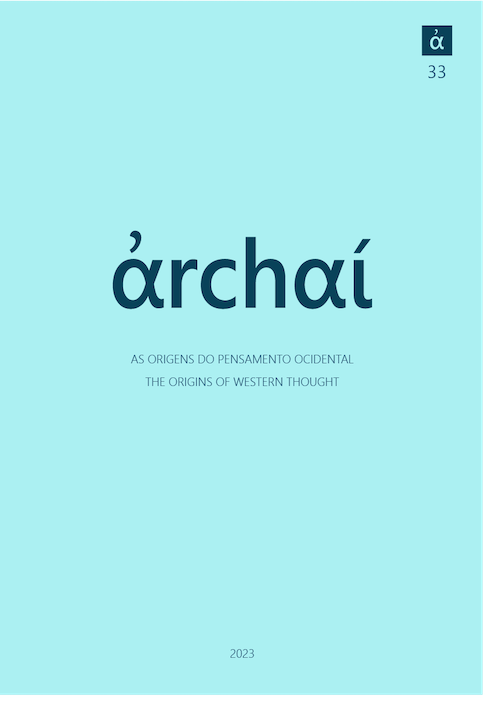Slave Emotion. Anger, Reason and Moral Responsibility in Aristotelian Ethics.
DOI:
https://doi.org/10.14195/1984-249X_33_22Keywords:
Aristotle, Rationality, Emotion, SlaveryAbstract
In the present work, I will review how Aristotle understood the connection between reason and emotion - particularly, angry actions - in order to demonstrate that it is due to the presence of intellectual factors that emotions become ethically relevant and not merely an uncontrolled reaction. Then, I will summarize Aristotle's repeated analogies between reason as the master and anger as the slave to explain their connection. My specific contribution to the topic will be to reverse this analogy and, instead of using it as an example of the lógos-thymós connection, make the latter an example of the despótes-doûlos connection as described in Politics I. If my hypothesis is plausible, establishing the actions and virtues of a slave will help shed light on the type of morality inherent in angry actions.
Downloads
References
ADKINS, A.W.H. (1970). From the Many to the One London, Constable & company.
BIEDA, E. (2022). La voluntad de la emoción. Cólera y pensamiento en la concepción aristotélica de la voluntariedad práctica. Daimon. Revista Internacional de Filosofía (en prensa). https://revistas.um.es/daimon/libraryFiles/downloadPublic/9661
BOERI, M. (2007). Apariencia y realidad en el pensamiento griego Buenos Aires, Colihue.
BROADIE, S. (1991). Ethics with Aristotle Oxford, Oxford University Press.
COOPER, J.M. (1988). Some remarks on Aristotle’s moral psychology. The Southern Journal of Philosophy XXVII, p. 25-42.
COPE, M. & SANDYS, E. (1877), Aristotle. Rhetoric, Cambridge University Press.
DOW, J. (2015). Passions and persuasion in Aristotle’s Rhetoric. Oxford, Oxford University Press .
FILLION-LAHILLE, J. (1970). La colère chez Aristote. Revue des Études Anciennes LXXII, 1-2, p. 46-79.
FORTENBAUGH, W.W. (1974). Aristotle on Emotion London, Duckworth.
FORTENBAUGH, W.W. (1977). Aristotle on Slaves and Women. En: BARNES, J.; SCHOFIELD, M.; SORABJI, R. (eds.). Articles on Aristotle 2. Ethics and Politics London, Duckworth .
FORTENBAUGH, W.W. (2006). Aristotle’s practical Side. On his Psychology, Ethics, Politics and Rhetoric Leiden-Boston, Brill.
FRANK, J. (2004). Citizens, Slaves and Foreigners: Aristotle on Human Nature. American Political Science Review XCVIII, 1, pp. 91-104.
GARDINER, H.N (1919). The Psychology of Affections in Plato and Aristotle. The Philosophical Review XXVIII, 1, pp. 1-26
GOODEY, C.F. (1999). Politics, Nature, and Necessity: Were Aristotle's Slaves Feeble Minded? Political Theory XXVII, 2, p. 203-224.
KNUUTTILA, S. (2004). Emotions in Ancient and Medieval Philosophy Oxford, Clarendon Press.
IRWIN, T. (1999). Aristotle. Nicomachean Ethics Translated, with introduction, notes and glossary. Indianapolis, Hackett.
KRAUT, R. (2002). Aristotle. Political Philosophy Oxford, Oxford University Press .
LORENZ, H. (2009). Virtue of Character in Aristotle’s Nicomachean Ethics. Oxford Studies in Ancient Philosophy XXXVII, p. 177-212.
NUSSBAUM, M. (2018). La ira y el perdón Mexico, FCE.
PELLEGRIN, P. (2013). Natural slavery. En: DESLAURIERS, M.; DESTRÉE, P. The Cambridge Companion to Aristotle’s Politics Cambridge, Cambridge University Press, p. 92-116.
RAMOS-UMAÑA, L. (2022). Filosofía del deseo. Aristóteles y el thymós Tópicos LXII, p. 65-95.
ROSSI, G. (2018). The Causal Structure of Emotions in Aristotle: Hylomorphism, Causal Interaction between Mind and Body, and Intentionality. En: BOERI, M. et. al. (eds). Soul and Mind in Greek Thought. Psychological Issues in Plato and Aristotle, New York, Springer, p. 177-198.
SHERMAN, N. (1991). The Fabric of Character Oxford, Clarendon Press , Oxford.
SIHVOLA, J. (1996). Emotional animals: Do Aristotelian emotions require beliefs? Apeiron 29, p. 105-144.
SIMPSON, P.L.P. (2014). The Great Ethics of Aristotle London; New York, Routledge.
Downloads
Published
How to Cite
Issue
Section
License
Copyright (c) 2023 Esteban Bieda

This work is licensed under a Creative Commons Attribution 4.0 International License.
Given the public access policy of the journal, the use of the published texts is free, with the obligation of recognizing the original authorship and the first publication in this journal. The authors of the published contributions are entirely and exclusively responsible for their contents.
1. The authors authorize the publication of the article in this journal.
2. The authors guarantee that the contribution is original, and take full responsibility for its content in case of impugnation by third parties.
3. The authors guarantee that the contribution is not under evaluation in another journal.
4. The authors keep the copyright and convey to the journal the right of first publication, the work being licensed under a Creative Commons Attribution License-BY.
5. The authors are allowed and stimulated to publicize and distribute their work on-line after the publication in the journal.
6. The authors of the approved works authorize the journal to distribute their content, after publication, for reproduction in content indexes, virtual libraries and similars.
7. The editors reserve the right to make adjustments to the text and to adequate the article to the editorial rules of the journal.



